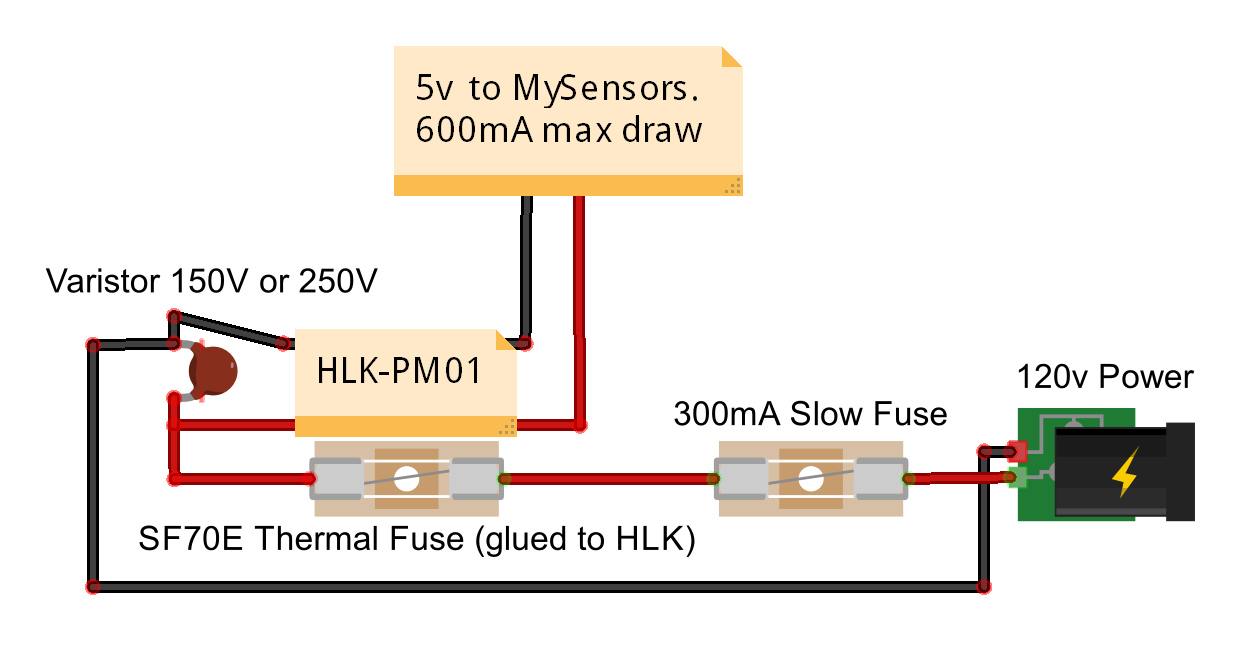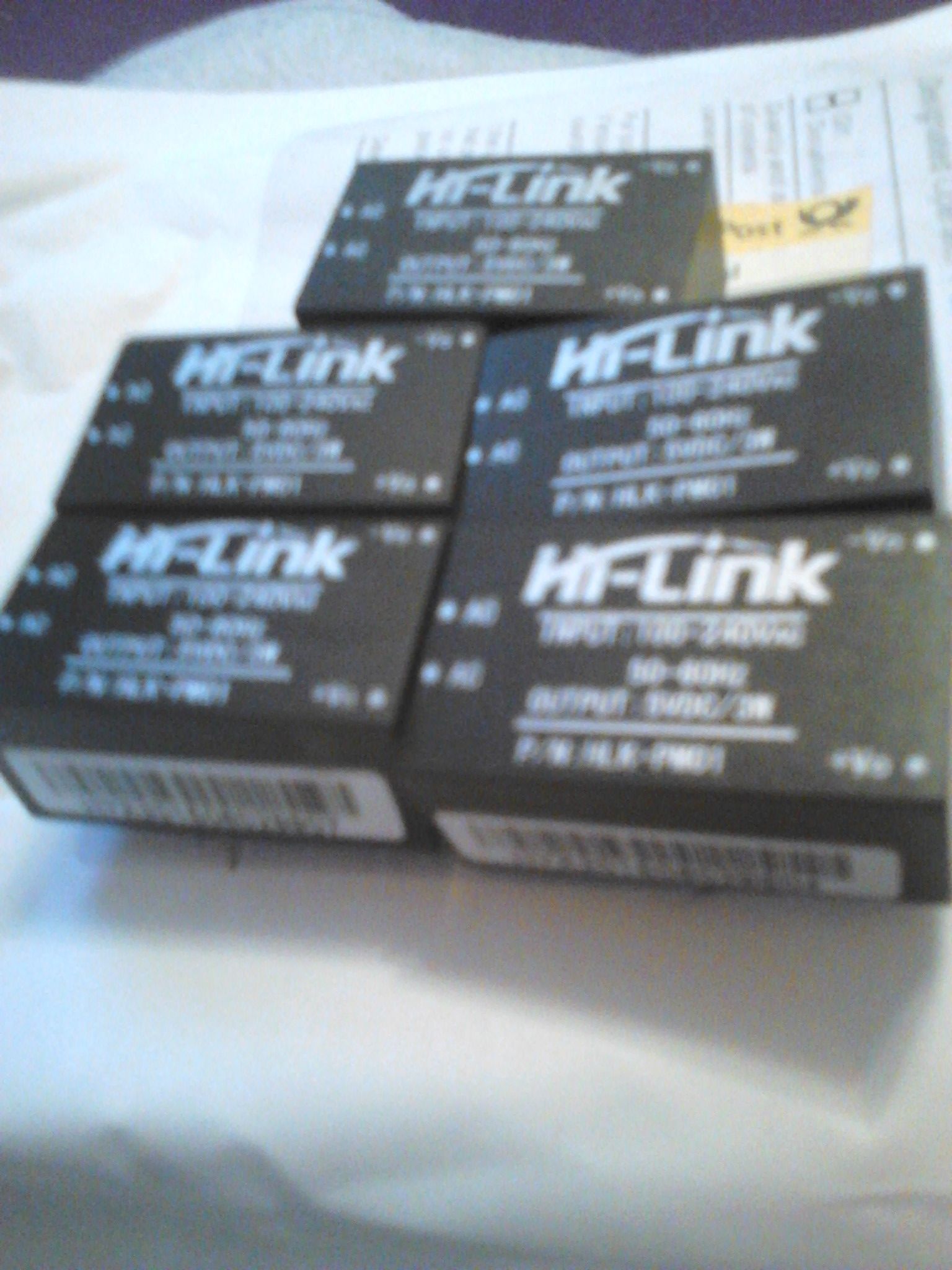Safe In-Wall AC to DC Transformers??
-
@Yveaux this RECOM AC to DC converter will safe or not for put it to in the wall.
because I have to start live HOME Automation.
-
-
@Yveaux thank you for your reply....
You mean that I can put this RECOM inside the wall box...behind the switch board. -
Does anyone know of any 120V AC to 5V DC transformers that are safe to put in a wall electrical box? I have been using old cell phone chargers for most of my projects but I was recently pondering putting something right in the wall. Since shipping can take so long I thought I'd ask now before I even start on the project.
I did some searching and couldn't find anything so I thought I'd ask the experts here.
Thanks in advance!
EDIT 9/7/2016
Watch out for Fakes! Read more here: https://forum.mysensors.org/topic/1607/safe-in-wall-ac-to-dc-transformers/355
If in doubt you can get them directly from the vendor here: http://www.hlktech.net/product.php?CateId=10EDIT 12/28/2015
After MUCH discussion on this here are the findings of this thread (as of now):Here is the diagram for how things should be wired:

These are the parts I ordered. I haven't tested any of these parts yet as this project has been put on the back burner for now :(. I am in the USA so this is spec'd for 120 VAC. If you're using 240 you will need to change the size of the Varistor but everything else should be fine for 240.
Also, see these posts for more discussion/ideas if interested:
http://forum.mysensors.org/topic/1540/110v-230v-ac-to-mysensors-pcb-board
http://forum.mysensors.org/topic/2488/in-wall-pcbVaristor for 120VAC - http://www.ebay.com/itm/321024816822?_trksid=p2057872.m2749.l2649&ssPageName=STRK%3AMEBIDX%3AIT
73°C Thermal Fuse - http://www.ebay.com/itm/221560426284?_trksid=p2057872.m2749.l2649&var=520415979885&ssPageName=STRK%3AMEBIDX%3AIT
250V 300mA Slow Blow Fuse - http://www.ebay.com/itm/111433875797?_trksid=p2057872.m2749.l2649&var=410420838583&ssPageName=STRK%3AMEBIDX%3AIT
HLK-PM01 - http://www.ebay.com/itm/351418782712?_trksid=p2057872.m2749.l2649&ssPageName=STRK%3AMEBIDX%3AIT
Pete
@petewill @didi found a cheaper source:
http://www.tme.eu/en/details/gs05e-usb/mains-power-supplies/mean-well/
shipping to the US 9.90. still ridiculously expensive but not as bad as mouser -
@Moshe Livne: interesting. I didn't know that tme has it. They have nice enclosure too, like those for wall ac adapter http://www.tme.eu/en/katalog/enclosures_100431/#id_category=100628&s_field=artykul&s_order=ASC&page=1
I live in EU. And for shipping I think they are good, regarding Rs, farnell, and mouser too. But not the same catalog unfortunately. -
@Moshe Livne: interesting. I didn't know that tme has it. They have nice enclosure too, like those for wall ac adapter http://www.tme.eu/en/katalog/enclosures_100431/#id_category=100628&s_field=artykul&s_order=ASC&page=1
I live in EU. And for shipping I think they are good, regarding Rs, farnell, and mouser too. But not the same catalog unfortunately.@scalz these are new i think and beibg propagated to shops. Every time I search i get more....
-
@Didi sharpening your knives and putting the plier in the fire?
-
aaaaaaah, you are lucky, I have not received mine yet!!!
I am thinking about something for OVP and OTP:- at my job we use MCP9509 for OTP. As OTP is for output load (and not for input I think), it could be possible to use MCP9509 and P Mosfet to cut off the load if any temp problems occurs. I think it could be sufficient like this.
- for OVP, why not using a varistance at the input??? And then if a problems, your fuse in your electrical service box would blow.
I think this module has others protection.. so maybe it could do the job. I am not sure but like this I think it couldn't burn. It is just an idea as I am not expert. But can't wait to see how it is inside!!!
-
Mine arrived too. But I don't have equipment / knowledge to test it properly. So I will go for "real-life test". The wall boxes / wires here are fire-proof (and placed into brick walls), so the risk of real fire is reduced.
And I'm running my Arduino-dimmers for 6 months now, all powered by really cheap phone charges, so hopefully these modules will be a bit safer ;-)
-
Mine arrived too. But I don't have equipment / knowledge to test it properly. So I will go for "real-life test". The wall boxes / wires here are fire-proof (and placed into brick walls), so the risk of real fire is reduced.
And I'm running my Arduino-dimmers for 6 months now, all powered by really cheap phone charges, so hopefully these modules will be a bit safer ;-)
@rvendrame would be interested to see how you wire everything together
-
@petewill @didi found a cheaper source:
http://www.tme.eu/en/details/gs05e-usb/mains-power-supplies/mean-well/
shipping to the US 9.90. still ridiculously expensive but not as bad as mouser@Moshe-Livne said:
@petewill @didi found a cheaper source:
http://www.tme.eu/en/details/gs05e-usb/mains-power-supplies/mean-well/
shipping to the US 9.90. still ridiculously expensive but not as bad as mouserCool, thanks!
@Didi can't wait to hear how they work! That was fast shipping!!
-
Hi,
I am new here and decided to join this forum, because of this interesting discussion.
Some weeks back, I was looking for a cheap AC-DC converter and ran into the Hi-Link modules. The have very nice specs, but I discovered that there are no stamps to prove it.I too plan to bring an offer to the gods of AC-DC, so I will build a module into a safe box and see what happens when I start annoying it.
I'd like to finish for now with a remark to rvendrame, if I may:
It is true that stone is very difficult to ignite, but fire and heat also melts the plastic coating of the elektric wires and this can lead to high currents that are just not high enough to blow the fuse in the mains fusebox and this can ultimately lead to fire elsewhere in your house.Regards,
Bert -
I got some hi-link modules a while back on a "I might need these in the future" type deal.
I was wondering though how to protect the connections. I got some fuses+pcb holders to add extra protection however there is going to be at least 4 points which will be exposed.
Can I just cover the joints with hot glue to stop them from making contact with anything? Call me paranoid but I like to be extra safe.
-
I got some hi-link modules a while back on a "I might need these in the future" type deal.
I was wondering though how to protect the connections. I got some fuses+pcb holders to add extra protection however there is going to be at least 4 points which will be exposed.
Can I just cover the joints with hot glue to stop them from making contact with anything? Call me paranoid but I like to be extra safe.
@Qu3Uk For covering solder connections you can use 'heatshrink'. Kind of 'plastic' tubes that you put around a wire, apply heat (keep a lighter/match underneath (not in the flame) for example) and it shrinks around the connection.
-
I got some hi-link modules a while back on a "I might need these in the future" type deal.
I was wondering though how to protect the connections. I got some fuses+pcb holders to add extra protection however there is going to be at least 4 points which will be exposed.
Can I just cover the joints with hot glue to stop them from making contact with anything? Call me paranoid but I like to be extra safe.
@Qu3Uk You could protect the high voltage part of the circuit by mounting a plastic plate under the pcb using some spacers and screws. This way it would be impossible to touch the dangerous spots. I would not recommend hot glue because you never know how well it isolates. I don't think you will find electrical specs for hot glue. ;)

